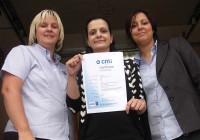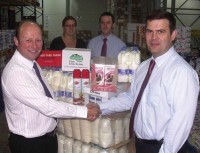 Oakland International, the Redditch-based multi temperature supply chain specialist’s focus was, and still is, on providing an end-to-end solution to all retailers. However Oakland recognised a gap in the market and looked to take ownership of stock on behalf of clients through Oakland Distribution, which was successfully launched in 2009. It was a business expansion plan that has proved hugely successful, and has led to major business breakthroughs across the retail and convenience sectors.
Oakland International, the Redditch-based multi temperature supply chain specialist’s focus was, and still is, on providing an end-to-end solution to all retailers. However Oakland recognised a gap in the market and looked to take ownership of stock on behalf of clients through Oakland Distribution, which was successfully launched in 2009. It was a business expansion plan that has proved hugely successful, and has led to major business breakthroughs across the retail and convenience sectors.
Working with business partners such as The Dairy Trader, Oakland has enjoyed award success, recently winning the Business Initiative of the Year category at The Grocer Gold Awards for their unique consolidation scheme. The joint venture combined Oakland’s supply chain experience together with The Dairy Trader’s expertise sourcing dairy products.
The Dairy Trader Scheme is a bespoke consolidation scheme, succeeding where previously no other independent provider has done so on a sustained basis. Since its launch in February 2010, The Dairy Trader Scheme has developed a strong customer base, and continued to add business from manufacturing customers, which has helped supplement its product range, and sales under the Scheme are set to exceed £2m in 2011. Dean Attwell, Managing Director of Oakland International, spoke to The Grocery Trader.
The Grocery Trader – First of all, Dean, can you talk us through the different parts of Oakland International?
We have three companies, Oakland International, Oakland Ireland and Oakland Distribution. I started Oakland International 13 years ago with my wife Sallie and four colleagues, offering a multi temperature supply chain service to the multiple retailers, taking in Tier One, Two and Three retailers and wholesale and foodservice destinations throughout the UK.
GT – How did Oakland Distribution come about?
 Our chilled consolidation schemes continue to prove successful, operating with the likes of retail and convenience groups such as Musgrave and Spar, traditionally an area where Oakland has done well. Oakland Distribution was specifically set up to service wholesalers, in response to their request for a different offer: one invoice from multiple suppliers and Oakland taking title of stock, originally led by Landmark, our first customer in wholesale distribution.
Our chilled consolidation schemes continue to prove successful, operating with the likes of retail and convenience groups such as Musgrave and Spar, traditionally an area where Oakland has done well. Oakland Distribution was specifically set up to service wholesalers, in response to their request for a different offer: one invoice from multiple suppliers and Oakland taking title of stock, originally led by Landmark, our first customer in wholesale distribution.
GT – How big is Oakland’s operation now?
Oakland International will turn over £10m in 2011 and Distribution will be nearly £9m, with the distribution side of the business the only one where we take title; it is deliberately structured at low margins.
GT – Does Oakland International still offer co-packing and distressed load management services?
Yes, we do. Within Oakland International we have an extensive co-packing operation, which has grown from mostly providing freeze and thaw tempering for seasonal party foods and short shelf life products. Small suppliers produce frozen product in bulk, which we release and temper in batches and deliver to customers daily or as required, giving them wider distribution and giving the retailers maximum shelf life.
We now have full insurance industry approval for our distress load management service, which enables up to 80% recovery of loads that have been maliciously tampered with, water damaged or otherwise distressed.
GT – How is Oakland Ireland doing?
Oakland Ireland is the mirror image of Oakland International’s UK operation. We offer Irish producers supply chain solutions into Irish retailers and help exporters trade with the UK, as well as providing a local solution for UK and other European producers wishing to export to Ireland. We run road shows to encourage small and medium producers, and explain how retailers work here and in Ireland: for many, it’s the first time they’ve been supported like this. We are also delighted to have won the National Checkout Award for Best Third Party Distributor early in November. Our business partner, Caffrey International, also won ‘Best Exporter’ in the recent national transport awards – so between us we are now recognised as being amongst the industry leaders in Ireland.
GT – Does Oakland Ireland get involved in sales and marketing and ‘bringing on’ these companies?
Sales and marketing isn’t our main expertise, but we work closely with brokers and sales agents and brokers who can help in this area. Our in-house QA team can advise on packaging, bar codes and so on and assist with BRC approval.
GT – How are the various businesses organised?
Oakland International, Oakland Ireland and Oakland Distribution are three separate companies, with three directors in common: myself, Managing Director, my wife Sallie, Marketing Director, and Paul Ziolek, Operations Director. I have a co-Managing Director in Ireland (which is a 50:50 partnership with Mark Caffrey of Caffrey International Transport), and an additional director supporting our UK business.
Oakland International and Oakland Distribution run independently with separate management and staff but share premises and vehicles as appropriate, and have a common IT and HR platform. We’ve set up Oakland Distribution with a separate focus and team, because the attention to detail needed is so intense.
GT – How do you run your service to the UK foodservice and wholesale sectors? Does everything go through Oakland Distribution?
 Bookers, Palmer & Harvey and Brakes are still handled through Oakland International, with more recent wholesale activity going through Oakland Distribution. We supply the bulk of UK cash ‘n’ carries through Oakland Distribution, which now has 112 customers and 180 drops per week.
Bookers, Palmer & Harvey and Brakes are still handled through Oakland International, with more recent wholesale activity going through Oakland Distribution. We supply the bulk of UK cash ‘n’ carries through Oakland Distribution, which now has 112 customers and 180 drops per week.
GT – Which cash ‘n’ carries and delivered wholesalers are the biggest customers?
Landmark is our biggest overall customer. We deliver to Landmark members’ DC’s, including Parfetts and Blakemores, with Oakland Distribution delivering to over 80 other UK wholesaler and foodservice depots, as well as to some individual stores. Muller is a recent hub scheme that was launched in July 2011, and is now handling an increasing number of their wholesale drops.
GT – Do you do your own deliveries?
We don’t: we work with entrusted delivery partners across the UK and Ireland, to give maximum flexibility. Wherever possible we also use retailers’ own backhaul/primary solutions.
GT – What products does Oakland Distribution handle?
Oakland Distribution carries some 300 chilled SKU’s, including milk, butter, cheese, cooked meats, hard and soft fats and around 350 ambient products. The customers and scheme members drive the product list. Any supplier can go to any customer and do a deal whereby the supplier invoices the customer direct and uses Oakland as the distribution route, paying Oakland a supply chain fee. The other option is for the supplier to do a commercial deal with the wholesaler and then invoice Oakland at sale price less delivery cost. Most producers are existing suppliers to wholesalers: the choice is to use us for invoicing, or not. The benefits for producers are cash collection, bad debt reduction and no stock deterioration risk.
GT – How many days a week do you deliver to these locations?
We deliver between once and three times per week, depending on the size of the depots/customer.
GT – Is there a minimum order quantity?
We generally work on a 100 case minimum order per delivery, with any combination of chilled and ambient SKUs.
GT – How does the multiples’ supply chain compare to the independent sector, meaning convenience and wholesale?
The independent sector is big, but lacks the discipline the multiples impose in product flow and centralised distribution control. We believe that the independent supply chain cost is around 40% more expensive than it is for the big five retailers.
In range terms, the non-affiliated independent retail sector is strong on ambient products, but not chilled. The IGD and Tesco spotted this some time back, and now there are over 6,000 convenience stores operated by the Big Five, competing at neighbourhood level with the 55,000 independents. In the independent sector, a strong chilled offer is essential to build footfall and additional sales. Nisa, Spar and Musgrave have proved good c-stores can succeed, but to really work the independent wholesalers must buy in. The IGD figures show independent retailers visiting cash ‘n’ carries two or three times a week. Cash ‘n’ carries need to put the chilled display in their main aisles so that buyers are forced in front of the chilled offer on every shopping trip.
GT – What are you (Oakland) doing to help improve the supply chain for the independents?
 The fact we’ve set up a separate operation, Oakland Distribution, signals our recognition of this market’s importance. We work on a low margin and shouldn’t be beaten on price: it reflects our commitment to growing the market and introducing supply chain professionalism into the independent sector. We’re customer/ consumer-centric and stock whatever we’re asked to carry: we’ll also increase drop frequency to support the offer. Ultimately we’d like to deliver seven days a week, like we do to the multiples.
The fact we’ve set up a separate operation, Oakland Distribution, signals our recognition of this market’s importance. We work on a low margin and shouldn’t be beaten on price: it reflects our commitment to growing the market and introducing supply chain professionalism into the independent sector. We’re customer/ consumer-centric and stock whatever we’re asked to carry: we’ll also increase drop frequency to support the offer. Ultimately we’d like to deliver seven days a week, like we do to the multiples.
GT – Why has it been important, at times, to take ownership of the goods?
We do so because the market wants it: that’s the way it’s always been, but it’s no reason to continue! People can use us as their invoice partner or distribution partner, whichever: we’re there anyway and the train still goes, never mind who the passengers are.
GT – Are you offering the Oakland Distribution service to anyone besides Landmark members?
We’re offering it to all. This year and 2012 are big growth years with big targets: the market’s crying out for our services. It’s been great to have Landmark with us from the start: we’re loyal to them, and they obviously benefit from our close relationship, but ultimately whichever wholesalers we work with, if the numbers go up, the lower our prices become.
GT – Silly question: don’t lower prices ultimately mean less money for you?
Higher distribution costs are a waste of money all round: yes, our profit expectation is lower in Oakland Distribution than in Oakland International, but we’re not sacrificing our profit margin as efficiencies increase, we’re simply working to bring costs down. We’re talking to other large wholesale groups: this can’t work without member support.
GT – Are smaller deliveries equally welcome?
Yes, there are plenty of opportunities for small and symbol groups to come in too: with several thousand SKU’s to choose from across both Oakland models and just one mixed pallet being delivered, it doesn’t get any better.
GT – How does your partnership work with The Dairy Trader?
The Dairy Trader Scheme’s customers can access products at affordable prices without minimum order stipulations, a service other independent providers don’t offer. Our high degree of industry knowledge and expertise, and their exact understanding of the requirements of independent wholesalers, cash and carries and food manufacturing, has allowed us to unlock new opportunities and open doors in a highly receptive market place. A bespoke service, The Dairy Trader is the only dairy consolidation scheme to offer fresh cream and milk throughout mainland UK.
GT – Who are The Dairy Trader’s customers?
 We supply anyone needing deliveries of milk, cream, butter, cheese and a full range of ambient products. We go to independent foodservice suppliers and wholesalers, and small manufacturers and speciality food producers sourcing dairy products as raw materials. Some small producers’ businesses are rocketing because of the exposure we give them.
We supply anyone needing deliveries of milk, cream, butter, cheese and a full range of ambient products. We go to independent foodservice suppliers and wholesalers, and small manufacturers and speciality food producers sourcing dairy products as raw materials. Some small producers’ businesses are rocketing because of the exposure we give them.
GT – Are you looking for more customers for The Dairy Trader?
We’re always looking for more customers!
GT – Where do you see your involvement with The Dairy Trader leading?
Who knows?! We’re reviewing all the options, and will explore the possibilities.
GT – If you can summarise, what areas should the convenience and wholesale sectors concentrate on to compete with the multiples?
There’s never been a better time to offer a convenience format: people expect to pay more for convenience, but not much more than at Tesco Express! You need the right mix of product categories, the right SKUs and a balance between eat now and take home. The convenience market should grow by over 32% by 2015, but if we don’t support the independents, they’ll lose out to the large supermarket chains. Chilled is the key.
GT – How important is local product sourcing for the independent sector?
 There’s a major opportunity to involve local producers. Local product sourcing can work well, and is a major selling point for retailers: all the stats show more consumers want local produce, and it’s great for suppliers to have access to local retailers.
There’s a major opportunity to involve local producers. Local product sourcing can work well, and is a major selling point for retailers: all the stats show more consumers want local produce, and it’s great for suppliers to have access to local retailers.
GT – Do you have a strategy to support the independent sector?
We want them all to succeed. We’re not looking to replace successful trading relationships: we believe we’re the only ones offering a true partnership approach. Whichever part of our model people want, they can have.
GT – How can a company like yours help regional producers improve their businesses?
Producers who previously just dealt with farm shops tend to see entering retail as a major transition. If they talk to us about how the supply chain works, we can remove the myth and uncertainty. Our house rule is, no one’s too small: the day we refuse customers because they’re too small is the day I stop running the company! Our minimum weekly invoice is £50.
We’re not just interested in regional suppliers: any ethnic or niche product producers wanting improved distribution should call us too. The point is, the suppliers still have to sell their products to the retailers and caterers – we don’t do that.
GT – What do you think the biggest obstacles to growth are for the independent sector?
There are too many disjointed routes to market, too many channels, and too many people out to do the best deal in spite of the impact that this can have on supply chain efficiencies associated with attempts to improve on critical mass. The key to success is supplier and wholesaler collaboration working with a case consolidation partner.
GT – In your view, how can retail customers be inspired by wholesalers and cash ‘n’ carries to greater professionalism?
 People often say “You’ll never improve chilled’s performance in wholesale,” but it’s not true. The chilled category is under-trading by up to 80% in unaffiliated independents: wholesalers must recognise the problem, and move forward in unison with the independents. Some are doing a great job, Blakemore’s, Parfett’s and so on: any effort is worthwhile!
People often say “You’ll never improve chilled’s performance in wholesale,” but it’s not true. The chilled category is under-trading by up to 80% in unaffiliated independents: wholesalers must recognise the problem, and move forward in unison with the independents. Some are doing a great job, Blakemore’s, Parfett’s and so on: any effort is worthwhile!
GT – What effect has the recession had on your business?
The challenge is getting prices up – we’ve held our rates for eight or nine years despite rising fuel prices. We’ve driven business hard, to improve critical mass: we slightly underperformed last year, but now we’re ahead of target.
GT – Is the recession over?
No – I think we are in for a tough 2012. Margins are low, but everyone’s busy: growth is coming, and better margins will follow, hopefully in 2013.
GT – Are you looking to work with more manufacturers?
Yes, but not just manufacturers; producers, brokers, agents, buyers of stock. Some of our best relationships are with buyers: people want the best range and price but don’t always know who to ask. We’re also looking to work with more retailers, wholesalers and caterers.
GT – Finally, where do you see Oakland and its various businesses going from here?
We aim to increase our turnover to £64m by 2015 – more than treble, but achievable with the growth of the three models, and focus on international development. France is still on the radar: now we’ve tested the model in Ireland, we can make it work elsewhere. Our model is suited to those parts of the market crying out for reduced cost and complexity. Meanwhile we’re determined to protect our culture, keep our identity and bring more people into our family.
Oakland International
Tel: 01527 596 222




Comments are closed.